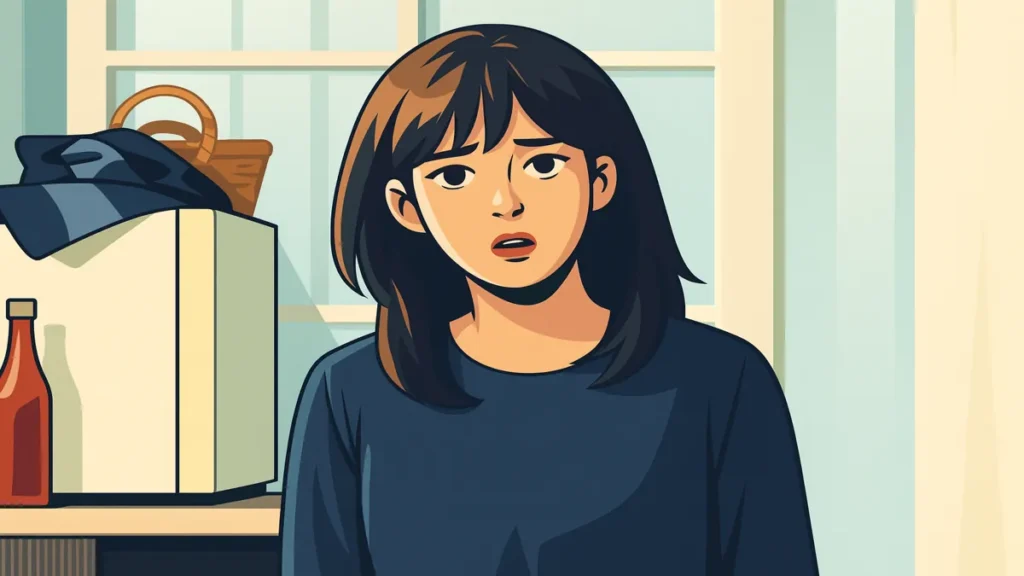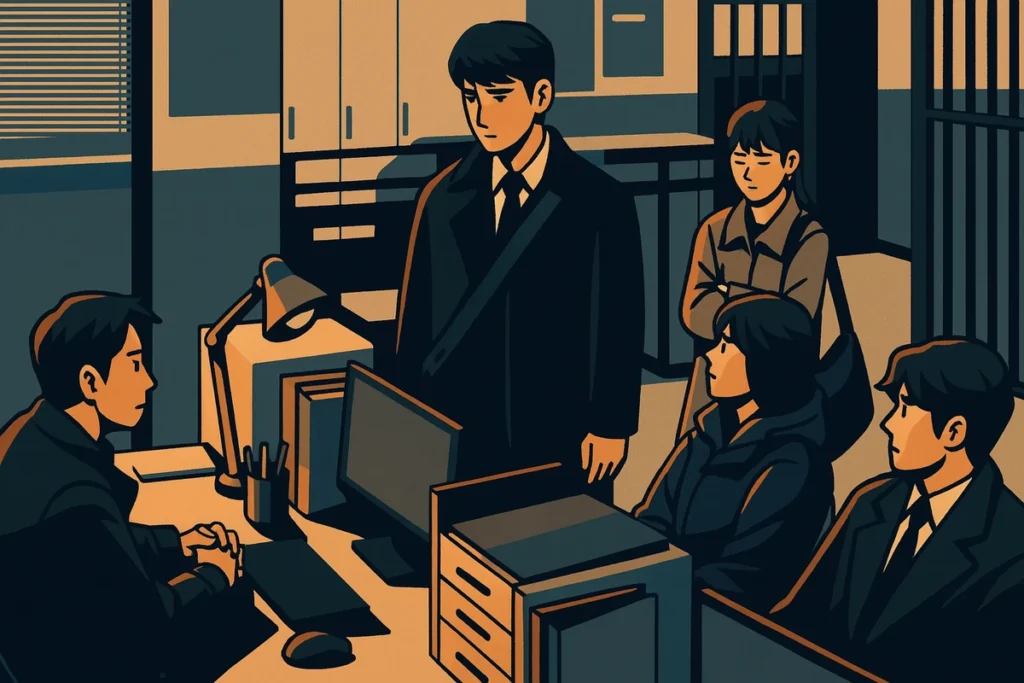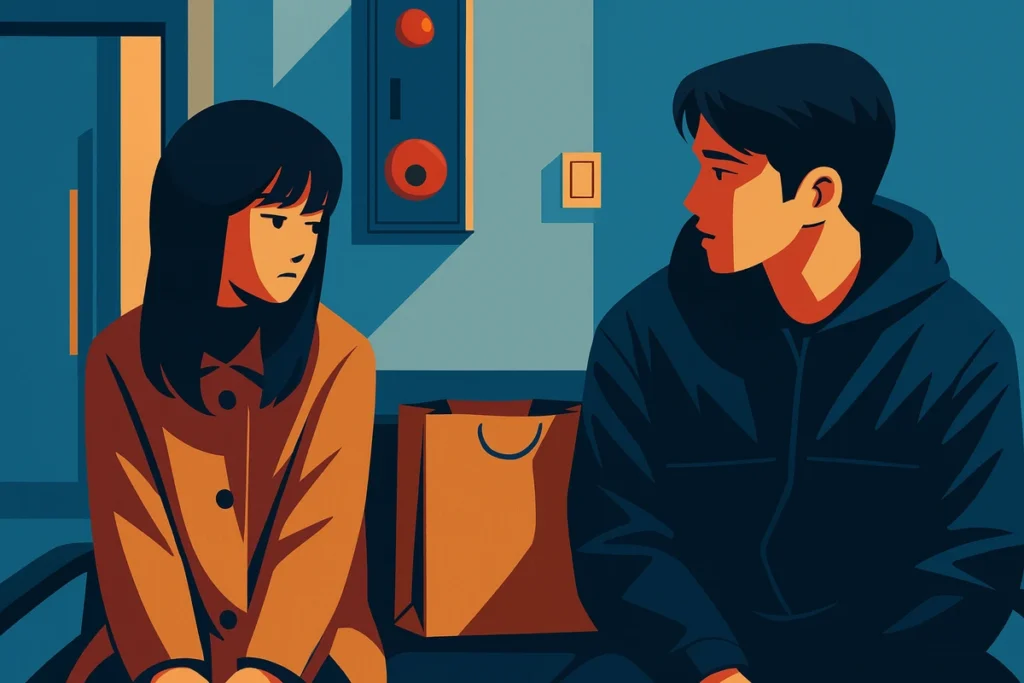[Image Source] AI illustration by DALL·E
TL;DR – Poverty, sacrifice, and unspoken love collide.
A daughter raised in hardship lashes out—“죽어라 갖고 싶은데…”—reflecting a lifetime of longing. Her mother responds not with regret, but with rugged pride: she fed and clothed her child with her best despite having so little.
The sarcasm, repetition, and 반말 in this scene expose deeper cultural wounds: poverty as moral currency, survival through marriage, and the tension between unspoken love and emotional collapse.
If you want to feel how Korean language expresses trauma, dignity, and love all at once—this is your scene.

1. Scene Snapshot
A small rooftop room with thin curtains swaying in the evening breeze. Across an old wooden table, Yang Geum-myeong and her mother, Oh Ae-soon, exchange words that carry years of weight. Geum-myeong speaks with the edge of someone who grew up lacking everything. Ae-soon responds with the tired pride of a woman who gave all she had but still feels unappreciated.
What starts as a simple confession—“I just keep wanting to buy things”—quickly turns into a clash over sacrifice, survival, and love rarely spoken aloud. Geum-myeong accuses her mother of treating hardship like a badge of honor. Ae-soon asks not for pity, but for acknowledgment. Beneath their sharp words lies something deeply Korean: love shown through struggle rather than gentle words.
This isn’t just an argument—it’s a generational collision, sharpened by sarcasm and shaped by the shadow of Korea’s economic past. Every phrase carries more than meaning; it carries lived history and unspoken truths.
📺 Watch the original scene here
[Source] YouTube, @드라마잼7
2. Micro-Dialogue
가진 게 별로 없이 커서인지, 계속 뭔가를 사게 돼
→ Maybe because I grew up with so little, I keep wanting to buy things.
미치도록 갖고 싶어도 평생 손에 못 넣고 자라다 보니
→ I wanted things so badly, but I grew up never able to have them.
이제는 아주 조금도 참고 싶지가 않아
→ Now I don’t want to hold back, not even a little.
그래도 너한테만큼은 내가 가진 것 중 가장 좋은 걸 먹이고 입혔어
→ Even so, I gave you the best of what I had to eat and wear.
엄마, 힘들게 산 게 자랑거리야? 불행을 왜 자랑처럼 말해?
→ Are you proud of living in hardship? Why speak of misery as if it’s an achievement
3. Culture & Subtext
3-1. Repetition as Emotional Build-Up
Korean often uses repetition for emotional intensity. “죽어라 갖고 싶은데 죽어도 못 가지면서…” repeats the word “죽다” not to suggest death, but to dramatize emotional suffering. This isn’t just poetic—it’s a cultural way to express pain too deep for plain words.
3-2. The Weaponization of Sacrifice
Geum-myeong’s sarcastic line cuts through a cultural nerve. In many Korean families, past hardship becomes a form of moral authority. “I suffered, so you should be grateful.” But this line turns that expectation upside down, asking: “Do you think poverty makes you righteous?” It’s rare to hear a child speak this way—but when it happens, it signals rupture.
3-3. Marriage as Survival Tactic
When Ae-soon suggests marriage, it’s not a romantic solution. It’s a reflex from an older generation where women had few options. This line reveals how deeply the trauma of poverty is woven into Korean ideas of security. For many mothers, “getting married” wasn’t just advice—it was a desperate wish for their daughters to suffer less.
3-4. Dignity in Hardship
The word “쨍쨍했다” (bright, dazzling) is rarely used to describe life. Ae-soon uses it to reclaim her narrative—not as a victim, but as a woman who found color despite grayness. For learners, this is a glimpse into how the Korean language can express quiet pride wrapped in modesty.
3-5. Sarcasm, 반말, and Emotional Collapse
Throughout the scene, Geum-myeong uses casual speech (반말) even in emotionally high-tension moments, which might seem disrespectful. But that’s part of the pain—children who love deeply but don’t know how to express it often speak bluntly. In Korean, silence and sarcasm usually stand in for vulnerability.
❓ FAQ (Frequently Asked Questions)
Q1. When a child says, “엄마는 가난이 유세야?” in a drama, is this kind of scene realistic in Korean society?
→ This question often appears on Quora and Reddit. On Quora, users ask things like “Why do some Korean dramas show children confronting parents over past sacrifice?” On Reddit, user macar0ns noted that “maternal abandonment… is a common motif for moving the plot and developing a main character,” pointing out how expectations of motherhood and sacrifice are often portrayed as sources of conflict in Korean dramas. [Source] reddit.com
Q2. Why do Korean dramas emphasize parental sacrifice and silence instead of open emotional expression?
→ In Korean society, emotions are often expressed through responsibility and sacrifice rather than direct words. One Reddit user explained, “When I was younger… divorce for women meant lost custody… Women used to stay in abusive relationships so they could keep their kids.” In this cultural context, sacrifice becomes a substitute for saying “I love you.”
Q3. Are there other K-dramas that explore similar mother-daughter conflicts?
→ Reddit users frequently recommend dramas like “When the Camellia Blooms,” “Life, Fight for My Way,” and “When the Weather Is Fine”. Each of these explores themes of conflict, reconciliation, and personal growth between parents and children. A key theme in many is how past poverty or trauma influences current family dynamics, much like the tension revealed in “가난이 유세야?”
4. Grammar in Action
4-1. “가진 게 거의 없이 자라서 그런지, 자꾸 뭘 사고 싶어져요.”
🔍 Analysis
– 가진 게: 가지다 (to have) + attributive suffix -ㄴ → 것 (thing) + subject particle -이 → contracted to 게
– 거의 없이: 거의 (almost) + 없다 (to not have) + adverbial suffix -이
– 자라서: 자라다 (to grow up) + connective ending -아서 (because)
– 그런지: 그러하다 (to be so) + -ㄴ지 (whether/if; speculative cause)
– 자꾸: adverb, repeatedly
– 뭘: contraction of 무엇을 (what + object particle)
– 사고 싶어져요: 사다 (to buy) + -고 싶다 (want to) + -어지다 (to become inclined to) + -어요 (polite ending)
📌 Example Usage
“부족하게 자라서 그런지, 소비 욕구가 잘 줄지 않아요.”
Maybe because I grew up with little, my desire to buy things doesn’t fade easily.
☀ Meaning
Links childhood scarcity with ongoing desire for material things.
🧩 Similar Patterns
– “가난하게 커서 그런지, 쓰는 걸 잘 못 줄여요.”
→ “Maybe because I grew up poor, I can’t cut back on spending very well.”
– “갖고 싶은 게 계속 생겨요.”
→ “I keep finding new things I want.”
💬 Usage & Variation
– Formal: “어려운 환경에서 성장하여 소비 성향이 강합니다.”
→ “Having grown up in a difficult environment, I have a strong tendency to spend.”
– Casual: “어릴 때 못 가져서 그래, 자꾸 사고 싶어져.”
→ “It’s because I couldn’t have things when I was a kid—I keep wanting to buy stuff.”
4-2. “아무리 원해도 손에 넣지 못한 채 커 왔으니, 지금은 조금도 참고 싶지 않아요.”
🔍 Analysis
– 아무리: adverb, no matter how
– 원해도: 원하다 (to want) + -아/도 (even if)
– 손에 넣지 못한 채: 손 (hand) + 에 (locative) + 넣다 (to put/obtain) + -지 못하다 (cannot) + -ㄴ (past attributive) + 채 (while in that state)
– 커 왔으니: 크다 (to grow) + -어 오다 (continuative aspect) + -았으니 (since/because)
– 지금은: now + topic marker
– 조금도: not even a little
– 참고 싶지 않아요: 참다 (to endure) + -고 싶다 (want to) + 지 않다 (not) + -아요 (polite ending)
📌 Example Usage
“원해도 가질 수 없었던 시절을 겪었으니, 이제는 참기 싫어요.”
Since I couldn’t have what I wanted back then, I don’t want to hold back now.
☀ Meaning
Past deprivation fuels present refusal to restrain oneself.
🧩 Similar Patterns
– “못 누렸으니 지금이라도 해보고 싶어요.”
→ “Since I couldn’t enjoy it before, I want to try it now.”
– “어릴 때 못해서 어른 돼서 다 해요.”
→ “I couldn’t do it as a kid, so I do it all as an adult.”
💬 Usage & Variation
– Strong: “이젠 절대 안 참아요.”
→ “I’ll never hold back now.”
– Soft: “이젠 조금은 제 마음대로 하고 싶어요.”
→ “Now I want to do things my way, at least a little.”
4-3. “그래도 너한테는 내가 가진 것 중에서 가장 좋은 것만 먹이고 입혔어.”
🔍 Analysis
– 그래도: adverb, even so
– 너한테는: 너 (you) + 한테 (to) + topic marker “-는”
– 내가: I + subject marker
– 가진 것 중에서: 가지다 (to have) + -ㄴ (modifier) + 것 (thing) + 중에서 (among)
– 가장 좋은 것만: 가장 (most) + 좋다 (good) + -은 (modifier) + 것 (thing) + 만 (only)
– 먹이고 입혔어: 먹이다 (to feed) + -고 (and) + 입히다 (to clothe) + -었어 (past)
📌 Example Usage
“있는 것 중 최고만 너한테 줬어.”
I gave you the very best I had.
☀ Meaning
Shows parental devotion despite personal limitations.
🧩 Similar Patterns
– “내 것보다 네 걸 더 챙겼어.”
→ “I took care of your things more than my own.”
– “최고만 주고 싶었어.”
→ “I only wanted to give you the best.”
💬 Usage & Variation
– Formal: “자녀에게 최상의 것을 제공했습니다.”
→ “I provided my child with only the very best.”
– Casual: “좋은 건 다 너 줬잖아.”
→ “I gave you all the good things, you know.”
4-4. “엄마, 힘들게 산 게 자랑이 돼? 왜 고생을 훈장처럼 말해?”
🔍 Analysis
– 엄마: mom
– 힘들게: 힘들다 (to be hard) + -게 (adverbial)
– 산 게: 살다 (to live) + -ㄴ (modifier) + 것 (thing) + 이 → contracted to 게
– 자랑이 돼: 자랑 (pride) + subject marker + 되다 (to become) + “-아/어” (sentence ending)
– 왜: why
– 고생을: 고생 (hardship) + object marker
– 훈장처럼: 훈장 (medal) + 처럼 (like/as)
– 말해: 말하다 (to speak) + 해 (casual present)
📌 Example Usage
“왜 힘들었던 걸 자랑처럼 얘기해?”
Why talk about hardships like they’re something to boast about?
☀ Meaning
Challenges framing hardship as moral superiority.
🧩 Similar Patterns
– “불행을 자랑하네?”
→ “You’re bragging about your misfortune?”
– “고생담만 늘어놓네.”
→ “You’re just listing your hardship stories.”
💬 Usage & Variation
– Cynical: “또 고생 얘기야?”
→ “Is it the hardship story again?”
– Soft: “그 얘기 들으니 속상해요.”
→ “Hearing that story makes me feel upset.”
4-5. “그래도 난 나름대로 행복했어. 내 인생에도 빛나는 순간이 있었어.”
Even so, I was happy in my way. My life had moments that shone.
🔍 Analysis
– 그래도: even so
– 난: 나 (I) + 는 (topic marker) → contracted
– 나름대로: in my way
– 행복했어: 행복하다 (to be happy) + past tense + sentence ending “-어” (informal)
– 내 인생에도: 내 (my) + 인생 (life) + “-에” (locative particle) + “-도” (also)
– 빛나는: 빛나다 (to shine) + -는 (modifier)
– 순간이: 순간 (moment) + subject marker “-이”
– 있었어: 있다 (to exist) + past tense + sentence ending “-어” (informal
📌 Example Usage
“나름 좋은 순간도 있었어.”
I had my share of good moments.
☀ Meaning
Affirms dignity by acknowledging bright moments despite hardship.
🧩 Similar Patterns
– “그래도 웃을 날은 있었어.”
→ “Still, there were days I could smile.”
– “빛난 때도 있었지.”
→ “There were shining moments, too.”
💬 Usage & Variation
– Positive emphasis: “좋았던 순간들이 많았어.”
→ “There were many good moments.”
– Measured: “나름 괜찮았어.”
→ “It wasn’t so bad, in its way.”
5. Natural Korean Toolkit
간절해서 잠도 못 잘 만큼 갖고 싶었다
I wanted it so much I couldn’t even sleep.
→ Try changing your tone.: “목숨 걸 만큼 원했다”, “심장이 두근거릴 정도로 원했다”
“I wanted it so much I couldn’t even sleep.”
“I desired it as if my life depended on it.”
힘들었던 걸 왜 자랑처럼 말해?
Why talk about your hardships like they’re something to boast about?
→ Similar phrase: “불행했던 얘기를 왜 뽐내?”, “고생한 걸 자랑하네?”
“Why talk about your hardships like they’re something to boast about?”
“Why make your misfortune sound like an achievement?”
나름 반짝이던 순간이 있었다
Some moments shone in their way.
→ Say it with a different vibe.: “그때는 마음이 환하게 빛났다”, “그래도 웃을 날은 있었어”
“There were moments that shone in their way.”
“Back then, my heart felt bright.”
엄마 발자취를 그대로 따르라는 거야?
Are you telling me to follow in Mom’s footsteps exactly?
→ Let’s change it depending on the emotion.: “그 삶을 나도 반복하길 바라?”, “나도 그런 인생 살라고?”
“Are you telling me to follow in Mom’s footsteps exactly?”
“Do you expect me to live that same kind of life?”
6. Quick Quiz or Expression Drill
Translate the feeling, not just the words.
6-1. “없어도 참고 살아왔으니, 이제는 절대 참기 싫어.”
→ What emotion is driving this sentence?
a) anger
b) desperation
c) greed
6-2. Fill in the blank with a more natural Korean expression:
“I wanted it so badly.” → “______ 갖고 싶었어.”
6-3. Which of these implies emotional resignation?
a) “결국 다 값싼 것뿐이네”
b) “갖고 싶은 게 너무 많아”
c) “먹이고 입혔어”
6-4. Rewrite in casual Korean:
“My life had its shining moments.”
6-5. What does “엄마는 가난을 자랑처럼 말해?” imply culturally?
📍 Want More Like This?
Dive deeper into Korean emotion, sarcasm, and family dynamics. These posts expand on how the Korean language expresses pain, pride, and generational tension—just like in this rooftop confrontation.
- 🔖 The Beauty of Korean Emotion Words: Learn to Speak with Feeling
- 🔖 Beyond Grammar: The Art of Omission in Korean
- 🔖 Understanding Korean Ambiguity: A Guide to the Beauty of Multilayered Expressions
- 🔖 Korean Honorifics vs. Informal Speech: Master the Basics with Practical Examples
🎥 More from This Drama? Let’s Keep Learning Korean! - Currently writing
Loved this scene? There’s more where that came from. Check out other moments from the same drama—each packed with new Korean phrases, cultural vibes, and teachable emotions.
- 🔖 “When Life Gives You Tangerines”: How Korean Drama Captures Painful Family Love
- 🔖 Korean Intuition Explained: Why Do Moms Sense Danger First?
Answers
6-1. b) desperation
6-2. 미치도록
6-3. a) “결국 다 값싼 것뿐이네”
6-4. 나름 반짝이던 때가 있었어.
6-5. It points out the cultural tendency to use past poverty as a way to claim moral high ground or self-worth.


